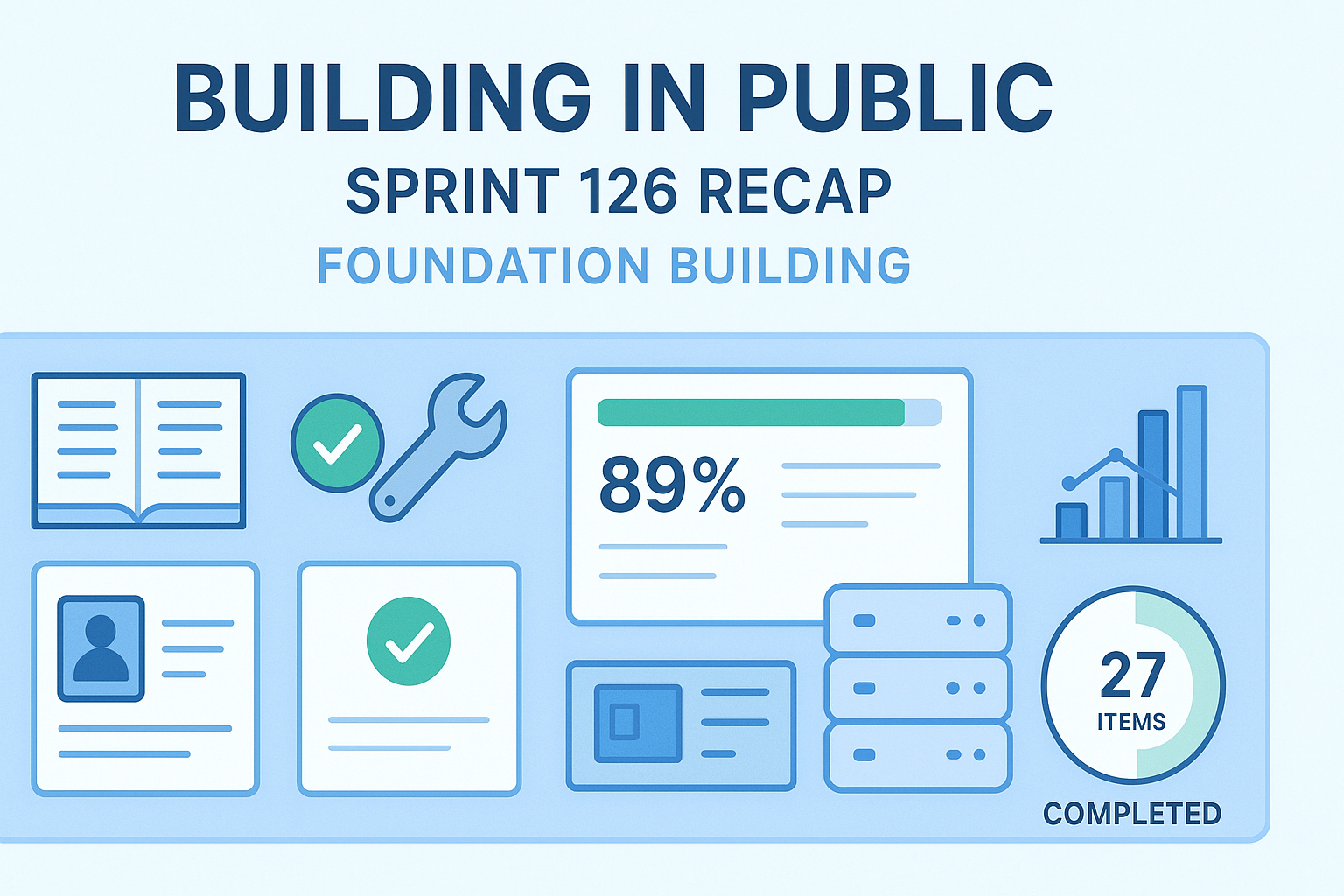
Another sprint in the books! Sprint 126 was a productive one with 27 completed items across both the Trading Card API ecosystem and CardTechie brand building. Here's what got done and what it means for the bigger picture.
What Got Done
📚 Documentation & Developer Experience (30%)
The biggest focus this sprint was improving developer experience across the board by making changes to tradingcardapi.com:
- Created comprehensive guides for different application types
- Cleaned up and simplified documentation introduction content
- Added proper beta disclaimers to set appropriate expectations
🐛 Production Stability (26%)
Real applications mean real issues to solve:
- Fixed production crashes that were affecting site reliability
- Resolved Docker build issues blocking deployments
- Cleaned up broken footer links and navigation issues
- Added newsletter signup to cardtechie.com
✍️ Content Creation (22%)
Continued the building-in-public approach with several new pieces:
- Published The Data Problem Every Card App Faces
- Created The Trading Card Industry's Technology Gap
- Added author bio sections to improve blog presentation
- Improved overall blog page design and functionality
✨ Infrastructure Improvements (15%)
Small but important upgrades:
- Set up Google Analytics for better insights
- Added email signup forms using Brevo integration
- Improved site navigation with admin links
- Renamed master branch to main (better late than never!)
📦 Maintenance (7%)
Keeping dependencies current:
- Updated Vue.js and Guzzle HTTP dependencies
- Routine security and performance updates
Key Highlight: tradingcardapi.com Goes Public
The biggest milestone this sprint was launching the public beta website for the Trading Card API at tradingcardapi.com. While the API has been in beta for some time, it finally has the professional documentation site it deserves.
This represents months of API development finally getting the public face it needs for broader developer adoption.
What This Sprint Reveals
Looking at the work distribution, Sprint 126 was clearly focused on polish and presentation. The heavy documentation investment (30%) shows preparation for wider API adoption. The production bug fixes (26%) demonstrate these are mature systems with real usage.
The balance between technical infrastructure and content creation reflects the dual approach: build great tools, then tell people about them.
Strategic Observations
Developer-First Thinking: Creating guides for specific application types rather than generic API docs shows understanding of how developers actually work.
Production Maturity: Proactively fixing bugs and improving reliability before they become major issues.
Content Consistency: Maintaining regular publishing while handling technical work shows commitment to the building-in-public approach.
Foundation Building: Much of this work creates capabilities that will pay dividends in future sprints.
What's Next
With solid documentation and a public website in place, Sprint 127 will likely shift toward:
- Developer outreach and community building
- Gathering feedback from the new public website
- Converting documentation readers into active API users
- Expanding based on real developer needs
- Getting changelogs into all products while refining the release process
- Making changes to the API based on developer feedback
- Releasing the PHP SDK as an official package
Building in Public Lessons
Polish Matters: Having great functionality isn't enough if it's hard to discover or understand. The launch of tradingcardapi.com bridges that gap.
Production Issues Are Learning Opportunities: Every bug fix teaches something about scale, user behavior, or system design.
Content as Strategy: Each blog post serves multiple purposes - sharing knowledge, building audience, and positioning expertise.
Incremental Progress: 27 items might seem modest, but each one moved multiple projects forward strategically.
By the Numbers
- 27 items completed across 2 main repositories
- 8 documentation improvements focused on developer experience
- 7 production bugs resolved for better reliability
- 6 content pieces created for thought leadership
- 4 infrastructure enhancements for better operations
- 2 dependency updates for security and performance
Sprint 126 was about taking existing capabilities and making them more accessible, reliable, and professional. Not the flashiest work, but exactly what was needed at this stage.
This is part of my "building in public" series where I share the real progress, challenges, and lessons from building CardTechie's suite of trading card technology tools.
 Josh Harrison is the founder of CardTechie and a software engineering manager with over 20 years of experience building scalable applications. As a lifelong trading card collector and developer, he's experienced both sides of the data problem firsthand—spending countless hours manually entering card information as a collector, and facing the challenge of sourcing reliable card data as a developer. Josh is currently working on solutions to make trading card data more accessible and interoperable across the ecosystem. Follow his work at
Josh Harrison is the founder of CardTechie and a software engineering manager with over 20 years of experience building scalable applications. As a lifelong trading card collector and developer, he's experienced both sides of the data problem firsthand—spending countless hours manually entering card information as a collector, and facing the challenge of sourcing reliable card data as a developer. Josh is currently working on solutions to make trading card data more accessible and interoperable across the ecosystem. Follow his work at